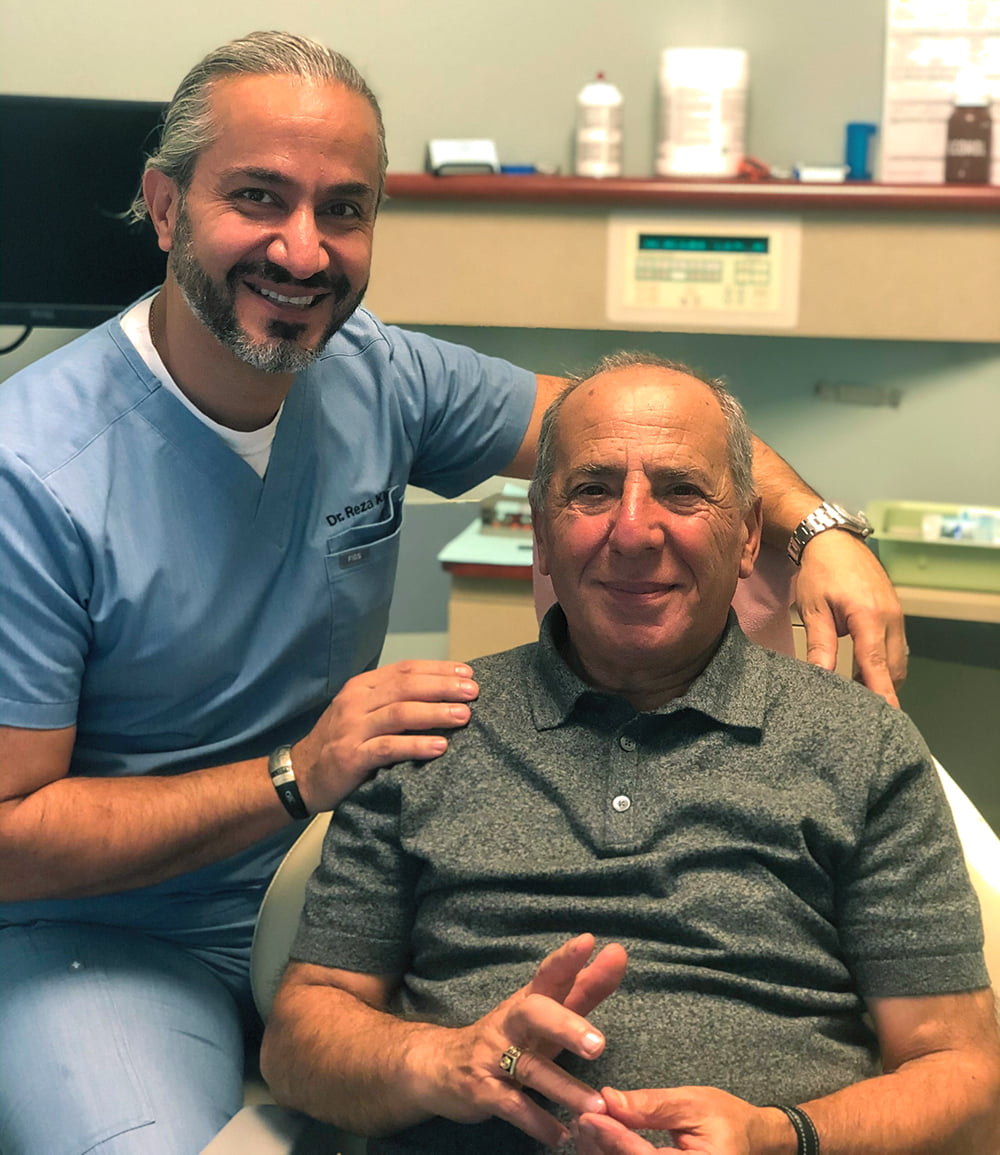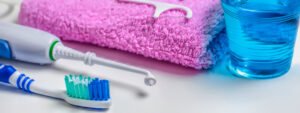Emergency Dentist
Here’s what you should do if you think you might have a dental emergency.
What is a dental emergency?
A dental emergency can be both a frightening and painful experience. Often people are unsure if they have a dental emergency, whom they should contact, and what they should do in the event they have a dental emergency. Below you will find some simple guidelines and action items you should take to best resolve your dental emergency.
“If you are not experiencing excruciating pain or unstoppable bleeding, call your dentist and explain the situation to them. Your dentist will be able to assess if you should see them right away or not. ”
— DR. REZA KHAZAIE, DDS. PROSTHODONTIST
Emergency Dental Near Me? Who Should I Contact?
If you think you might be dealing with a dental emergency — I recommend that you contact your dentist immediately. Your dentist will help you determine if you should see him/her right away.
If you are experiencing excruciating pain or bleeding that cannot be stopped, and your dentist’s office is closed, you should go to the emergency room.
If you are not experiencing excruciating pain or unstoppable bleeding, call your dentist and explain the situation to them. Your dentist will be able to assess if you should see them right away or not.
5 Steps for Coping With A Dental Emergency
1. Stay calm
Stay calm. During a medical emergency, it is easy to panic or experience anxiety. Don’t make the situation worse by allowing anxiety to influence poor decision making.
2. Self-evaluate
If you are experiencing symptoms of a medical emergency, such as pain, swelling, and bleeding, take a moment to self-evaluate and determine the location and scope of your symptoms. Is your pain, swelling, or bleeding localized to a specific place in your mouth or does it encompass an entire region such as one side of your face? Are your symptoms improving or getting worse? Is your dental pain constant or only when pressure is applied to a specific area? Answering some of these crucial questions will not only help you to identify some next steps, but also make it easier for your dentist to diagnose your condition. Once you have completed this mental checklist and evaluation, it’s time to gauge the urgency of your situation.

3. Determine urgency
Once you have completed a self-evaluation and made some initial determinations about your condition, it’s time to decide your next step.
Ask yourself the following: are your symptoms indicative of a dental emergency or can they be explained by something else? If you are experiencing signs of a dental emergency as described above (extreme pain, widespread swelling, unstoppable bleeding, etc.) then it’s time to call your dentist. In the event that your dentist is not available, such as during the middle of the night, you should go to the emergency room or go to an emergency clinic. If you are experiencing symptoms of a dental emergency, your life could be in danger. Do not hesitate to contact emergency services. If you determine that treatment can be delayed, make an appointment to see your dentist at the next earliest time.
4. Contact your dentist

If you think you might be in the midst of a dental emergency, your dentist should be your primary resource for diagnosis, treatment, and oral care advice. If you don’t have your dentist’s direct number, let the receptionist or person taking your call know that you are having a dental emergency and ask for the dentist to contact you directly. Often times, a hygienist or clinic nurse will be able to provide you with temporary self-care instructions or directions to the nearest emergency services provider. In the event that the clinic is closed or busy, don’t hesitate to go to the emergency room. Dental problems should be viewed as a larger health concern. Patients shouldn’t delay seeking treatment or help if a dental professional isn’t immediately available.
5. Consider temporary self-care measures
Sometimes you might have to take things into your own hands for a period of time while you wait to see a doctor or dental professional, or when waiting for emergency services. This is particularly true if you experience a dental issue during nighttime, weekends, or holidays when dental offices and clinics may be closed.
While oftentimes a dental emergency will require a professional solution, such as a dental extraction or oral surgery, there are still a number of steps someone can take at home to manage aspects of a dental emergency such as pain and swelling.

The Most Misunderstood Thing About Brushing Your Teeth
Brushing your teeth is the cornerstone of a healthy dental hygiene routine. We have been taught, told, and exhorted to […] Read More →
Is There A Solution for Sensitive Teeth?
Why Are My Teeth Sensitive? If you have ever taken a drink from a cold or hot beverage you likely […] Read More →For pain, patients can try swishing homemade mouthwash or a commercial variety in order to control bacteria, reduce the source of irritation, and prevent oral infections. Homemade saline washes are a great way to help ease your pain. You can make an effective saline solution for swishing by combining a teaspoon of salt and warm water in a mug. Another great solution for oral pain is with a prescribed pain killer. Advil and other NSAID (Nonsteroidal anti-inflammatory drugs — pronounced en-saids) pain relievers can not only help manage pain but also reduce swelling and inflammation.
For swelling and inflammation, we advise patients to apply a cold compress to the area to control and reduce the swelling.
In the event of dental trauma, particularly if you accidentally knock out a tooth or two, it would be beneficial to put those teeth in milk to help preserve them while you get to the emergency room.
Finally, it might also be helpful to gently floss your teeth. If you feel like you have a foreign object embedded between your teeth or beneath your gums, removing that might relieve the pain and help your situation.
No matter your dental emergency, one of the best things you can do is to stay calm. Stress and anxiety can often trigger physical bodily responses that are detrimental to your dental health as well as your overall well being.
Know who to call during a dental emergency
Your dentist is the obvious go-to person when you experience a dental emergency, but in some situations, it may be best to go straight to the emergency room. As a general rule, you should go to the emergency room if you are experiencing unbearable pain or bleeding that cannot be stopped and your dentist’s office is closed.
Always attempt to call your dentist first and explain your symptoms and current condition. A good dentist will make an effort to see you as soon as possible. Depending on how well you are able to communicate your condition, your dentist may be able to provide you with advice over the phone.
Prevention is the best way to avoid dental emergencies
An ounce of prevention is worth a pound of cure.
While some dental emergencies are unavoidable, many if not most dental issues can be easily avoided with some preventative care. Prevention is not only the most effective way to avoid emergencies, but it is also the most cost-effective and easiest way to avoid future dental emergencies.
Preventative measures include daily dental hygiene, eating a healthy diet, and regular visits to a dental clinic for checkups and cleanings. Tips for preventing dental emergencies include:
- Floss daily.
- Brush daily twice per day.
- Visit a dentist once or twice per year for a dental checkup and professional cleaning.
- Eat a healthy diet high in essential vitamins and minerals and low in sugar.
- Exercise.
- Take care of your body as a whole. What affects one part of your body may have a health ripple effect on the rest of your body.
- Treat dental issues immediately. Don’t put off dental treatment.
If you practice good preventative dental health, you will be far less likely to experience painful and expensive dental emergencies later on. While flossing, brushing, and visiting a dentist are obvious preventative measures, healthy eating and exercise can be just as important.
Another important and often overlooked strategy for preventing dental emergencies is dealing with dental issues swiftly and rigorously as soon as they pop up and before they become a larger problem. This includes getting dental fillings, treating oral infections, and dealing with dental gum problems earlier rather than waiting until they become a major nuisance or emergency.
 Written by Dr. Reza Khazaie
Written by Dr. Reza Khazaie